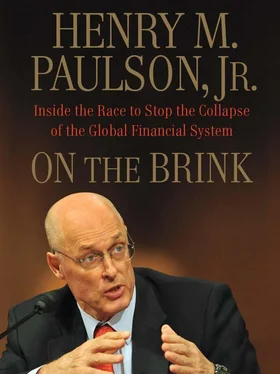I came to Washington as an advocate of free markets, and I remain one. The interventions we undertook I would have found abhorrent at any other time. I make no apology for them, however. As first responders to an unprecedented crisis that threatened the destruction of the modern financial system, we had little choice. We were forced to use the often inadequate tools we had on hand—or, as I often remarked to my team at Treasury, the duct tape and baling wire of an outdated regulatory regime with limited powers and authorities.
Our actions were intended to be temporary. If we don’t get the government out as soon as is practical, we will do grave harm to our economy. Yes, our first priority has to be recovery. But it is equally important that we exit these programs. This is critical to our own continued economic success.
The history of capitalism in America has been one of striking the right balance between profit-driven market forces and the array of regulations and laws necessary to harness these forces for the common good. In recent years, regulation failed to keep pace with rapid innovations in the markets—from the proliferation of increasingly complex and opaque products to the accelerating globalization of finance—with disastrous consequences.
In my time in Washington, I learned that, unfortunately, it takes a crisis to get difficult and important things done. Many had warned for years of impending calamity at Fannie Mae and Freddie Mac, but only when those institutions faced outright collapse did lawmakers enact reforms. Only after Lehman Brothers failed did we get the authorities from Congress to inject capital into financial institutions. Even then, despite the horrific conditions in the markets, TARP was rejected the first time it came up for a vote in the U.S. House of Representatives. And, amazingly enough, as I write this, more than one year after Lehman’s fall, U.S. government regulators still lack the power to wind down a nonbank financial institution outside of bankruptcy.
I am not sure what the solution is for this ever more troubling political dysfunction, but it is certain that we must find a way to improve the collective decision-making process in Washington. The stakes are simply too high not to. Indeed, we are fortunate that in 2008 Congress did act before the financial system collapsed. This took strong leadership in both the House and the Senate, because all who voted for TARP or to give us the emergency authorities to deal with Fannie and Freddie knew they were casting an unpopular vote.
Since I’ve left Treasury I’m often approached by people eager to hear about my experiences. Most often they have two basic questions for me: What was it like to live through the crisis? And what lessons did I learn that could help us avoid a similar calamity in the future?
I hope the book you’ve been reading answers the first question. The answer to the second question is obviously complex, but as I have thought about this over the last year or so, I would narrow down the many lessons into four crucial ones:
1. The structural economic imbalances among the major economies of the world that led to massive cross-border capital flows are an important source of the justly criticized excesses in our financial system. These imbalances lay at the root of the crisis. Simply put, in the U.S. we save much less than we consume. This forces us to borrow large amounts of money from oil-exporting countries or from Asian nations, like China and Japan, with high savings rates and low shares of domestic consumption. The crisis has abated, but these imbalances persist and must be addressed.
2. Our regulatory system remains a hopelessly outmoded patchwork quilt built for another day and age . It is rife with duplication, gaping holes, and counterproductive competition among regulators. The system hasn’t kept pace with financial innovation and needs to be fixed so that we have the capacity and the authority to respond to constantly evolving global capital markets.
3. The financial system contained far too much leverage, as evidenced by inadequate cushions of both capital and liquidity . Much of the leverage was embedded in largely opaque and highly complex financial products . Today it is generally understood that banks and investment banks in the U.S., Europe, and the rest of the world did not have enough capital. Less well understood is the important role that liquidity needs to play in bolstering the safety and stability of banks. The credit crisis exposed widespread reliance on poor liquidity practices, notably a dependence on unstable short-term funding. Financial institutions that rely heavily on short-term borrowings need to have plenty of cash on hand for bad times. And many didn’t. Inadequate liquidity cushions, I believe, were a bigger problem than inadequate capital levels.
4. The largest financial institutions are so big and complex that they pose a dangerously large risk . Today the top 10 financial institutions in the U.S. hold close to 60 percent of financial assets, up from 10 percent in 1990. This dramatic concentration, coupled with much greater interconnectedness, means that the failure of any of a few very large institutions can take down a big part of the system, and, in domino fashion, topple the rest. The concept of “too big to fail” has moved from the academic literature to reality and must be addressed.
There are a number of steps we should take to deal with these issues. To start, we should adjust U.S. policies to reduce the global imbalances that have been decried for years by many prominent economists. If, as a consequence of our current economic problems, American citizens begin to save more and spend less, we ought to welcome and encourage this change. We should go further and remove the bias in our tax code against saving—in effect moving toward a tax code based on consumption rather than income. The system we have today taxes the return on savings, giving incentives to spend rather than to save. Moving to a consumption tax would remove the bias against saving and help boost investment and job creation while reducing our dependence on foreign capital.
Our government needs to tackle its number one economic challenge, which is reducing its fiscal deficit. Our ability to meet this challenge will to a large extent determine our future economic success. We are now on a path where deficits will rise to a point at which we may simply be unable to raise the necessary revenues even if significant tax increases are imposed on the middle class. Dealing with this problem requires moving quickly to reform our major entitlement programs: Medicare, Medicaid, and Social Security. Any such reform needs to be done in a manner that recognizes and addresses the $43 trillion of built-in deficits that the GAO is projecting over the next 75 years. These will only become more difficult to deal with as time goes by. The longer we wait, the greater will be the burden on the next generation.
Striking the right balance to achieve both effective regulation and market discipline is another huge challenge we face. The recent crisis demonstrated that our financial markets had outgrown the ability of our current system to regulate them. Regulatory reforms alone would not have prevented all of the problems that emerged. However, a better framework that featured less duplication and that restricted the ability of financial firms to pick and choose their own, generally less-strict, regulators—a practice known as regulatory arbitrage—would have worked much better. And there is no doubt in my mind that the lack of a regulator to identify and manage systemic risks contributed greatly to the problems we faced.
We need a system that can adapt as financial institutions, financial products, and markets continue to evolve. Before the crisis forced us to shift from making long-range recommendations to fighting fires, Treasury conducted a thorough analysis of the proper objectives of financial services regulation, and this exercise led us to sweeping proposals for fundamental reforms. These recommendations were controversial when they were issued in March 2008, but in retrospect seem quite prophetic.
Читать дальше












